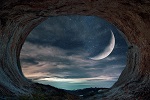
Could humans survive an apocalyptic event? The question has been explored in books and movies, so what about scientists?
Definitely. For one, there's something called SVAL'bard Global Seed Vault on the Norwegian island of Spitsbergen in the high arctic that stores over one million crop samples in an underground vault. This is one third of Earth's food crops. Not a bad start considering climate change could be a threat to our food supply as well.
But what about preserving the nearly seven million species of life on Earth, including plants, animals and even some microbes? It needs to be safe from events such as asteroid strikes, nuclear war, or large-scale volcanic eruptions. It must be ultra-cold, secure, and be accessible in order to repopulate Earth. Where is that ideal spot? Our moon! Scientists are calling it the Lunar Ark.
Getting the millions of samples there requires more than two hundred fifty space missions. They'd be stored underground in the moon's lava tubes which formed over three billion years ago. They're stable, safe from meteors and radiation.
The construction of the lunar arc would use camera and laser equipped robots to map the tubes. They'd also maintain the facility. Solar arrays would provide power and communication with Earth.
Some estimate it would take thirty years to complete the project. But in the face of an imminent crises, it could be done in fifteen. We already envision permanent human bases on the moon so maybe this is not so far-fetched!
More Information
Scientists want to store DNA of 6.7 million species on the moon, just in case
A "lunar ark" hidden inside the moon's lava tubes could preserve the sperm, eggs and seeds of millions of Earth's species, a group of scientists has proposed...
Sending DNA From Earth's 6.7 Million Species to the Moon to Safeguard Life
Researchers propose constructing a 'lunar ark' to provide our planet with a 'reset button' in the event of a world-ending catastrophe...
Scientists Plan to Store DNA on The Moon!
Svalbard Seed Vault is located in Norway, it holds over 1 million seed samples. In case there's a global disaster like climate change which causes a catastrophic loss of crop diversity. This vault has 500 seeds of almost every crop to revive humanity in the post apocalyptic world...